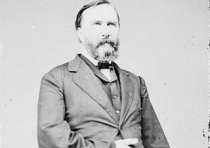
Morristown area home served as Longstreeet's headquarters after he assumed command of all forces in upper East Tennessee.
In the winter of 1863–1864, with heavy losses during the Siege of Knoxville, Confederate Gen. James Longstreet led his men out of the city on December 4, 1863. On December 10, Longstreet was given command of all forces in upper East Tennessee. Striking the Union army with a surprise attack, Longstreet won the Battle of Bean’s Station on December 14, 1863. Moving to Russellville, Longstreet and his staff established headquarters in the William Nenney Housewith a command center on the first floor. The soldiers built their winter hut camps along the railroad and also between the Holston and the Nolichucky Rivers. Longstreet’s cavalry protected a defensive line stretching between Rutledge to the north and Dandridge to the south. Faced with feeding about 25,000 men, the army took command of most of the mills, tanneries, and blacksmith shops in the area. Cain Mill near Russellville ground corn day and night to feed the army. On December 29, 1863, a large Federal cavalry and infantry force defeated part of Longstreet’s cavalry at Mossy Creek. By January 1, 1864, the temperature of 29 degrees below zero halted all hostilities. Several other engagements occurred during the winter as each side probed the other’s defenses and foraged for supplies. They included Hay’s Ferry (December 24, 1863), Dandridge (January 16-17, 1864), Fair Garden (January 26-27, 1864), and Blant’s Hill (January 28, 1864). The Federal defeat at Blant’s Hill was the last fight of Longstreet’s forces in this area. A larger and better supplied Union army failed to remove Longstreet from Russellville. The Nenney House served as headquarters until Longstreet moved to Greeneville on February 26, 1864.
Tools
Key Facts
- After winning at Bean's Station on December 14, 1863, Longstreet and his staff established headquarters in the William Nenney House in Russellville.
- The army took over most area mills, tanneries, and blacksmith shops to feed their 25,000 men.




